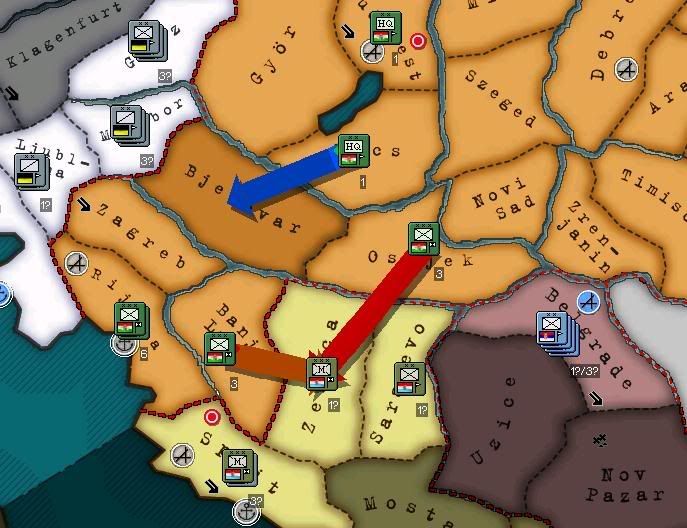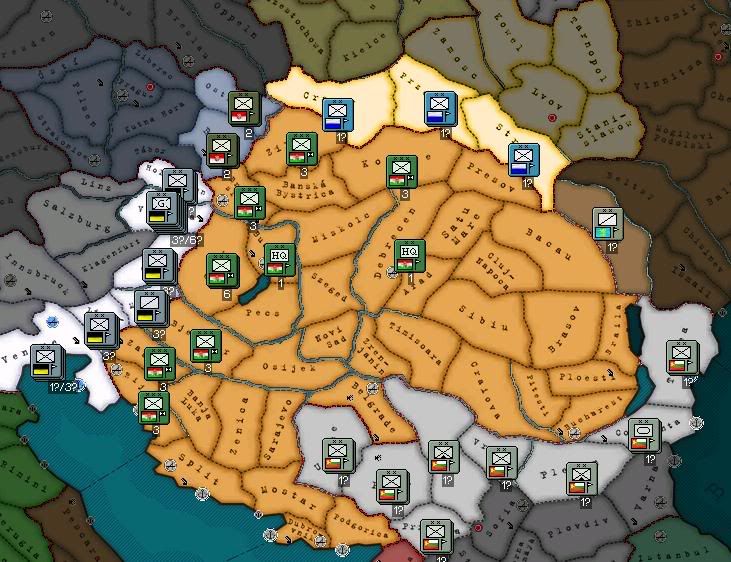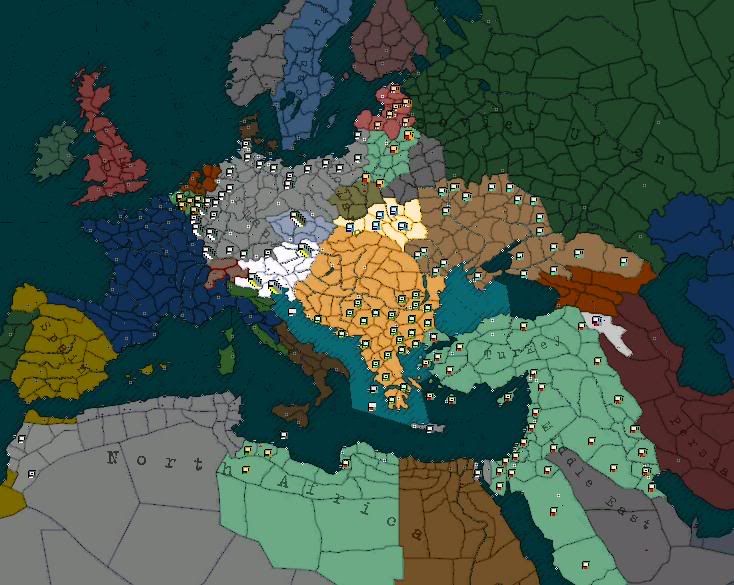So if you haven't read my other AAR (Magyar Revival), that game is into the 1950's, at a massive standoff, and lagging like a monster. So while I try to plug through that game at its glacial pace, I'm starting a second AAR to keep things moving and keep myself a little more entertained. I've never played a KR game past '38 before, so this is going to be an interesting experience from someone who doesn't really know what to expect. Since Kaiserreich is a total crazy alternate history where Germany and crew won World War I, I can't really do any historical research to make a nice intriguing opening because, well, it didn't actually happen. So for a prologue, I'll simply paste in the introduction that the game scenario provides, and then take this first update on its way!
As for the usual logistical notes... Normal/Normal, Kaiserreich version whatever-the-newest-one-is... Full IC take over off, full teach team take over on, democracies can declare war, and yeah. Hungary is nice in KR, starts off with 54 IC and three tech slots. Not a bad start compared to the little crapstack that Hungary is at the start of normal HOI!
=========
Before 1914, the Kingdom of Hungary regarded itself as a Great Power in its own right, as it constituted one half of the poewrful Habsburg Dual-Monarchy. Victory in the Welkrieg brought hte Kingdom territorial gains at the expense of Serbia and Romania, but not the dominant position in the east that the Hungarians expected. While its agrarian economy has not fared well in the face of cheap grain from the new Eastern Kingdoms (particularly Ukraine) the political troubles in Austria and the weak Imperial authority under the adolescent Emperor Otto has allowed the Magyars to follow a more independent line. A Hungarian national army has been formed, and a new strain of aggressive and expansionist nationalism, determined to “Magyarise” the divided peoples of hte Balkans, has come to the fore of Hungarian politics. While German meddling in 1927 prevented the Hungarians from cementing their dominant position in the Dual Monarchy, the next Ausgleich renegotiation should be the time when the whole of the Crown Lands of St. Stephen will finally be restored to the Magyar nation.
========
The year leading up to the 1937 Ausgleich re-negotiation was a tense one for Hungary. In parliament, on the radio, and in newspapers, ideologies clashed and tempers flared as debates on the future of the Austro-Hungarian empire raged on.
The traditionally-mined Imperialists pointed to the vast success and territories of the dual monarchy, arguing that the prosperity of the Empire was proof enough that Hungarians should not seek to fix what was not broken.
The strongly conservative Nationalists, on the other hand, argued that submission to the Habsburg rule served only to limit Hungary's power, and that the Magyar people would continually be forced to sacrifice their own ambitions to feed the power base of the Austrian state. The only way for Hungary to truly prosper, they argued, was to declare full independence and forge its own destiny.
The liberal-minded Federalists sought to dissolve the strong monarchy of the Empire, instead creating a federation of semi-independent states symbolically united under the Habsburg crown. Only through the cooperation of federated states, they contended, could the Empire reach its fullest potential.
Further compounding the issue were the harsh economic demands placed on Hungary by its Austrian neighbor -- the forced contribution of raw materials to Austria meant that, for much of the year, Hungarian industry operated at only a fraction of its actual potential, lacking the supplies to allow for the full utilization of its manufacturing power.
The 1937 Ausgleich
As 1937 began and the prospect of the Ausgleich negotiations become more and more real, the tension between Austria and Hungary threatened to reach a boiling point. It was no secret that there was a strong movement for independence in Hungary; it was also no great secret that Austria sought to increase its own authority in the negotiations, and that the two states were headed for a very heated series of negotiations. The Hungarian National Army, which had been increased somewhat in size during 1936, and the Austrian army both migrated toward the central borders of the two kingdoms, as both nations seemed aware of the prospect of war between the two powers of the Dual Monarchy. The anxiety was palpable on the Austro-Hungarian border as officials from both states began meeting in February to debate and negotiate the terms of the Ausgleich.
Otto I laid down his claims -- Austria would seek the total centralization of power, effectively placing Hungary under the complete an sole authority of Austrian leadership. Defiantly, Prime Minister Daranyi delivered the terms of the Hungarian kingdom -- total independence from Austria. Each side had made the most radical of possible demands.
Surprisingly, Otto I conceded to Hungary's desires for independence, allowing the kingdom its independence of February 20, 1937. The rather swift acquiescence of Austria boosted the confidence of the Hungarian people immensely -- the streets of Budapest soon became host to parties and parades, as Hungarian flags waved from windows and people celebrated their long-awaited autonomy.
On the issue of the Imperial territories, however, Otto was not so prepared to give ground. When Daranyi demanded the handover of Bosnia and Galicia to Hungary, the young Habsburg drew the line. Bosnia, as a small country of little significance, was willingly handed to Hungary. Galicia, however, was immediately taken off the table. Otto would refuse to hand it over, and would hear no more debate on the topic, despite Hungarian desires to press their claims aggressively.
The Croatian War of Independence
While Hungary and Austria were battling at the negotiating table, another conflict was soon to be ignited on the battlefield. As the mad rush to consolidate power in the former Imperial lands carried on, Hungary demanded that Croatia be dissolved and allow itself to be directly absorbed by the Hungarian state.
Unwilling to be used as a brokering chip in the escalating power struggle between the two states of the Dual Monarchy, Croatia firmly denounced Hungary's demands, vehemently insisting that Croatian sovereignty was not up for sale. Prime Minister Daranyi answered with a dramatic radio speech calling for the Magyarisation of the Dalmatian provinces, and proclaiming that if Croatia would not submit, it would be subjugated by force. Accordingly, he officially declared war on Croatia on April 3, 1937.
The Croats were quick to occupy Bosnia, as Hungary had not had ample time to station any troops there. Unfortunately for Croatia, however, the short-lived Bosnian occupation would be the only victory they would win for the entire course of the short conflict, which many historians have stated does not truly deserve to be classified as a “war.” Hungarian troops marched swiftly south, overrunning the meager Croatian army at every turn.

Hungarian army forces easily push back the Croatian army during the Croatian War of Independence
On June 9, 1937, the final lands of Croatia were overwhelmed, and Hungary declared its victory and its annexation of the former puppet nation, forcing the Croatians under the direct authority of Budapest.
Next Moves
With the victory in Croatia, Hungarian foreign policy camed to a crossroads. The desire for war with Austria was growing stronger, and many within the Hungarian government and among the people voiced their desire to take Galicia from the Austrians by force. Others favored military operations in the east, where Serbia and Iron Guard Romania’s declarations of war against Bulgaria could be used as an opportunity to seize additional lands and resources in order to make an eventual war with Austria easier.
Both sides lobbied for their position, but only one would prevail...

The Hungarian border situation following the subjugation of Croatia
=======
So, "Hungarian people" I'll turn to you readers for some guidance / suggestions / desires. I'll go in whichever direction you guys vote for. On one hand, Serbia and Iron Guard Romania shouldn't be too hard to invade and annex, since both of them are caught up fighting Bulgaria at the moment. The extra IC from both countries could help me build up the army and outrun Austria in an arms race. Or, conversely, I could jump in on the side of Romania and Serbia and try to annex as much of Bulgaria as I can.
I'll turn to you readers for some guidance / suggestions / desires. I'll go in whichever direction you guys vote for. On one hand, Serbia and Iron Guard Romania shouldn't be too hard to invade and annex, since both of them are caught up fighting Bulgaria at the moment. The extra IC from both countries could help me build up the army and outrun Austria in an arms race. Or, conversely, I could jump in on the side of Romania and Serbia and try to annex as much of Bulgaria as I can.
The other option is way less desirable -- declare war right away against Austria and Galicia. My army is -way- smaller than the Austrians, but if I can erect some fortifications along the border I might be able to hold them back long enough to quickly annex Galicia, and then try to sue for peace with Austria.
Thoughts?
As for the usual logistical notes... Normal/Normal, Kaiserreich version whatever-the-newest-one-is... Full IC take over off, full teach team take over on, democracies can declare war, and yeah. Hungary is nice in KR, starts off with 54 IC and three tech slots. Not a bad start compared to the little crapstack that Hungary is at the start of normal HOI!
=========
Before 1914, the Kingdom of Hungary regarded itself as a Great Power in its own right, as it constituted one half of the poewrful Habsburg Dual-Monarchy. Victory in the Welkrieg brought hte Kingdom territorial gains at the expense of Serbia and Romania, but not the dominant position in the east that the Hungarians expected. While its agrarian economy has not fared well in the face of cheap grain from the new Eastern Kingdoms (particularly Ukraine) the political troubles in Austria and the weak Imperial authority under the adolescent Emperor Otto has allowed the Magyars to follow a more independent line. A Hungarian national army has been formed, and a new strain of aggressive and expansionist nationalism, determined to “Magyarise” the divided peoples of hte Balkans, has come to the fore of Hungarian politics. While German meddling in 1927 prevented the Hungarians from cementing their dominant position in the Dual Monarchy, the next Ausgleich renegotiation should be the time when the whole of the Crown Lands of St. Stephen will finally be restored to the Magyar nation.
========
The year leading up to the 1937 Ausgleich re-negotiation was a tense one for Hungary. In parliament, on the radio, and in newspapers, ideologies clashed and tempers flared as debates on the future of the Austro-Hungarian empire raged on.
The traditionally-mined Imperialists pointed to the vast success and territories of the dual monarchy, arguing that the prosperity of the Empire was proof enough that Hungarians should not seek to fix what was not broken.
The strongly conservative Nationalists, on the other hand, argued that submission to the Habsburg rule served only to limit Hungary's power, and that the Magyar people would continually be forced to sacrifice their own ambitions to feed the power base of the Austrian state. The only way for Hungary to truly prosper, they argued, was to declare full independence and forge its own destiny.
The liberal-minded Federalists sought to dissolve the strong monarchy of the Empire, instead creating a federation of semi-independent states symbolically united under the Habsburg crown. Only through the cooperation of federated states, they contended, could the Empire reach its fullest potential.
Further compounding the issue were the harsh economic demands placed on Hungary by its Austrian neighbor -- the forced contribution of raw materials to Austria meant that, for much of the year, Hungarian industry operated at only a fraction of its actual potential, lacking the supplies to allow for the full utilization of its manufacturing power.
The 1937 Ausgleich
As 1937 began and the prospect of the Ausgleich negotiations become more and more real, the tension between Austria and Hungary threatened to reach a boiling point. It was no secret that there was a strong movement for independence in Hungary; it was also no great secret that Austria sought to increase its own authority in the negotiations, and that the two states were headed for a very heated series of negotiations. The Hungarian National Army, which had been increased somewhat in size during 1936, and the Austrian army both migrated toward the central borders of the two kingdoms, as both nations seemed aware of the prospect of war between the two powers of the Dual Monarchy. The anxiety was palpable on the Austro-Hungarian border as officials from both states began meeting in February to debate and negotiate the terms of the Ausgleich.
Otto I laid down his claims -- Austria would seek the total centralization of power, effectively placing Hungary under the complete an sole authority of Austrian leadership. Defiantly, Prime Minister Daranyi delivered the terms of the Hungarian kingdom -- total independence from Austria. Each side had made the most radical of possible demands.
Surprisingly, Otto I conceded to Hungary's desires for independence, allowing the kingdom its independence of February 20, 1937. The rather swift acquiescence of Austria boosted the confidence of the Hungarian people immensely -- the streets of Budapest soon became host to parties and parades, as Hungarian flags waved from windows and people celebrated their long-awaited autonomy.
On the issue of the Imperial territories, however, Otto was not so prepared to give ground. When Daranyi demanded the handover of Bosnia and Galicia to Hungary, the young Habsburg drew the line. Bosnia, as a small country of little significance, was willingly handed to Hungary. Galicia, however, was immediately taken off the table. Otto would refuse to hand it over, and would hear no more debate on the topic, despite Hungarian desires to press their claims aggressively.
The Croatian War of Independence
While Hungary and Austria were battling at the negotiating table, another conflict was soon to be ignited on the battlefield. As the mad rush to consolidate power in the former Imperial lands carried on, Hungary demanded that Croatia be dissolved and allow itself to be directly absorbed by the Hungarian state.
Unwilling to be used as a brokering chip in the escalating power struggle between the two states of the Dual Monarchy, Croatia firmly denounced Hungary's demands, vehemently insisting that Croatian sovereignty was not up for sale. Prime Minister Daranyi answered with a dramatic radio speech calling for the Magyarisation of the Dalmatian provinces, and proclaiming that if Croatia would not submit, it would be subjugated by force. Accordingly, he officially declared war on Croatia on April 3, 1937.
The Croats were quick to occupy Bosnia, as Hungary had not had ample time to station any troops there. Unfortunately for Croatia, however, the short-lived Bosnian occupation would be the only victory they would win for the entire course of the short conflict, which many historians have stated does not truly deserve to be classified as a “war.” Hungarian troops marched swiftly south, overrunning the meager Croatian army at every turn.

Hungarian army forces easily push back the Croatian army during the Croatian War of Independence
On June 9, 1937, the final lands of Croatia were overwhelmed, and Hungary declared its victory and its annexation of the former puppet nation, forcing the Croatians under the direct authority of Budapest.
Next Moves
With the victory in Croatia, Hungarian foreign policy camed to a crossroads. The desire for war with Austria was growing stronger, and many within the Hungarian government and among the people voiced their desire to take Galicia from the Austrians by force. Others favored military operations in the east, where Serbia and Iron Guard Romania’s declarations of war against Bulgaria could be used as an opportunity to seize additional lands and resources in order to make an eventual war with Austria easier.
Both sides lobbied for their position, but only one would prevail...

The Hungarian border situation following the subjugation of Croatia
=======
So, "Hungarian people"
The other option is way less desirable -- declare war right away against Austria and Galicia. My army is -way- smaller than the Austrians, but if I can erect some fortifications along the border I might be able to hold them back long enough to quickly annex Galicia, and then try to sue for peace with Austria.
Thoughts?








